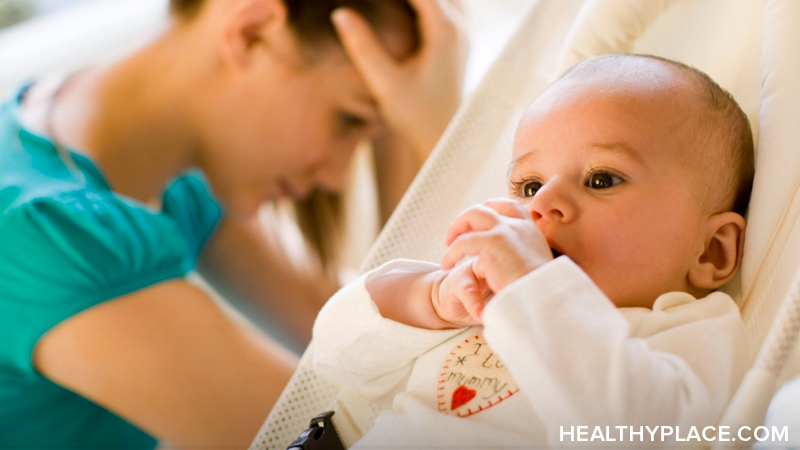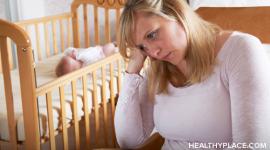Postpartum Depression and Anxiety: Symptoms, Causes, Treatments

Postpartum depression and anxiety aren’t unusual. After having a baby, about 15 percent of women experience postpartum depression (PPD), and between 10- and 17 percent develop postpartum anxiety (PPA). Some people experience just one. Others have both simultaneously. Postpartum anxiety and depression are real conditions that reduce the quality of life of mothers and their babies.
Know that postpartum depression and anxiety don’t have to interfere with your positive experiences with your new baby. Let’s take a closer look at these conditions and their symptoms, causes, effects, and treatments. Armed with knowledge, you can beat PPD and PPA.
Postpartum Depression and Anxiety Symptoms
If you’re dealing with postpartum depression and/or anxiety, you’ll probably feel certain symptoms. The below lists highlight common symptoms, but you might not experience all of them, and there might be some things you experience that aren’t on the lists. That’s because PPD and PPA are very individual experiences.
General postpartum depression symptoms can involve feeling nothing or feeling intense emotions:
- Feeling empty, numb
- Feeling disconnected from your baby, unable to bond
- Uncontrollable crying
- Irritability
- Anger, rage
- Resentment (of your baby, of your partner, of others not experiencing this)
Common postpartum anxiety symptoms can include:
- Racing thoughts and overthinking
- Disturbing thoughts of the baby becoming ill, dying, being harmed—possibly by its own mother
- Fear of your baby being taken away
- A foreboding sense of dread or impending doom
- Non-stop worries, what-ifs, and worst-case scenarios
- Inability to relax
- Avoidance of people and places
- Being over-controlling toward loved ones
- Inability to leave the house
- Frequent crying
What causes these bothersome symptoms?
Postpartum Depression and Anxiety Causes
While researchers are still studying what, exactly, causes postpartum depression and postpartum anxiety, they have discovered some likely culprits:
- Hormonal changes
- Heredity
- Lack of sleep
- Life stressors
- Changes in relationships
- Lack of support
- A baby that is difficult to care for
These causes of PPD or PPA can lead to the expression of symptoms. Symptoms lead to unwanted effects.
Effects of Postpartum Depression and Anxiety
Postpartum depression and anxiety can be mild, moderate, or severe. They can become severe enough to disrupt the mother’s ability to care for her baby, her family, and herself. At their worse, PPD and PPA cause suicidal thoughts and behaviors as well as thoughts of harming the baby.
These experiences involve life-disrupting effects that can be prolonged. Just a few of the effects on mothers can involve:
- Difficulty sleeping
- Feeling and/or acting on excessive fear that something bad will happen to the baby
- Second-guessing everything to the point where it becomes paralyzing
- Increased stress in the family
- Increased risk of divorce
- Restricted bonding between mother and baby
Infants can feel the effects of PPD and PPA as well. According to a 2009 study conducted by Feldman et al., babies who were unable to bond with their mothers because of PPA and PPD were affected in the following ways. Compared to peers, these infants demonstrated:
- Low social engagement, interaction
- Reduced ability to self-soothe
- More negative emotionality
- Increased tendency to experience stress reactions, as indicated by cortisol levels
Clearly, PPD and PPA are detrimental to the physical and mental health of both mothers and babies. The good news is that these conditions are temporary and treatable.
Postpartum Depression and Anxiety Treatment
Different treatment options exist for postpartum depression and postpartum anxiety. The most common treatments are approaches such as:
- Therapy, especially interpersonal therapy (IPT) or cognitive behavior therapy (CBT)
- Medication
- Inpatient hospitalization
- Partial hospitalization (attending a program during the day and returning home in the evening)
- Peer support groups for PPD
- Some natural treatments for PPD
Medication for Postpartum Depression and Anxiety
Medication for postpartum depression and anxiety can also be an effective option. If PPD or PPA are very disruptive, medication might be in order.
Most doctors feel that the best medication for postpartum depression and anxiety is selective serotonin reuptake inhibitors (SSRIs). Some of the most widely used SSRI antidepressants include:
- Celexa (citalopram)
- Effexor (venlafaxine)
- Lexapro (escitalopram)
- Paxil, Pexeva (paroxetine)
- Prozac, Sarafem (fluoxetine)
- Wellbutrin, Zyban (bupropion)
- Zoloft (sertraline)
Occasionally, benzodiazepines are prescribed for postpartum anxiety because they calm nerve activity in the brain. Examples of benzodiazepines prescribed for PPA are
Benzodiazepines aren’t as commonly used as SSRIs. Benzodiazepines are sedatives. They are highly addictive and are dangerous to nursing infants.
A new antidepressant called Zulresso (brexanolone) is the first drug specifically designed for postpartum depression. Approved by the FDA in March 2019 and available for use in June 2019, this IV administered medication offers the promise of quick and efficient PPD relief.
Sometimes, women fear that seeking help is a sign of a bad mother. This couldn’t be further from the truth. Seeking treatment is a sign of maternal love and personal strength. Understanding your PPD and PPA and seeking help when necessary will give you back the joys of caring for your new baby, and it will allow the two of you to bond.
APA Reference
Peterson, T.
(2022, January 3). Postpartum Depression and Anxiety: Symptoms, Causes, Treatments, HealthyPlace. Retrieved
on 2024, June 20 from https://www.healthyplace.com/depression/postpartum-depression/postpartum-depression-and-anxiety-symptoms-causes-treatments



